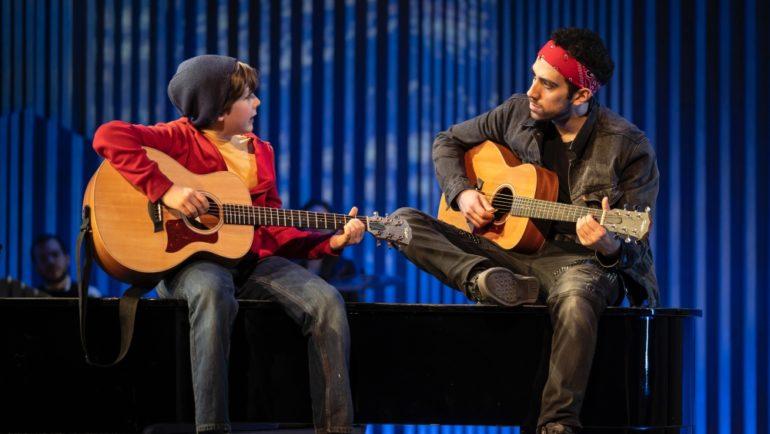Regional Theater Review: ‘August Rush’
By Steven Oxman
LOS ANGELES (Variety.com) – For the first quarter of this world premiere musical adaptation of the 2007 Warner Bros. film “August Rush ,” now playing at the Paramount Theatre in Aurora, Ill., it seems like director John Doyle’s elegant minimalism (“Sweeney Todd,” “ The Color Purple ”) might just manage to transform the divisive, unabashedly sentimental source material about the unifying power of music into something theatrical, meaningful, moving and classy. This is a short show, so that possibility lasts about 20 minutes. Then the sappiness kicks in for good, and even the Broadway-caliber talent and some musical high points from the onstage musician-ensemble can’t overcome the treacle.
This is not a show that attempts to appeal on the basis of a realistic depiction of character or narrative. It’s an emotional fairy tale about an 11-year-old boy (Jack McCarthy) who never knew his musician parents Lewis (George Abud) and Lyla (Sydney Shepherd), and who seeks to express his true self so deeply in music that they will find him. “Follow the Music,” the story and score tell us. Music will bring you home is the key theme of the melodic (and childish) musical lesson “Circle of Fifths.” “You’re a Symphony,” one song tells us several times, with a typically swelling crescendo of horn and wind instruments from composer Mark Mancina, who also scored the film.
This show, set in New York City, couldn’t be less urban. Set designer Scott Pask’s lovely white-on-white cut-outs transform with lighting (Paul Toben) and projections (Joe Burke) into a cityscape background, but the basic inspiration seems to be a classical concert stage. Costume designer Ann Hould-Ward puts a lot of white on the musician-ensemble as well. The fact that the significant black characters from the film never even appear (or are portrayed by performers who aren’t black) in Glen Berger’s (“ Spider-Man: Turn Off the Dark ”) book adds even more to the bland palette. The whiteness of the show extends to the music.: out is the Oscar-nominated gospel song “Raise It Up;” in is the blonde Shepherd attempting to rap certain phrases while playing the cello. It’s very awkward.
The show starts simply and appealingly enough. After McCarthy (“Finding Neverland”) sings the opener, we get a charming extended scene in which Lewis and Lyla fall for each over music. As Lewis, Abud (“The Band’s Visit”) brings the only quirkiness to the stage, and his costume the only touch of grunge, albeit of the Bruce Springsteen-y kind. The piece has the most personality when he’s present. The couple’s brief love affair is depicted with music and choreography (from Joann M. Hunter, offering nothing to write home about). At least the storytelling is clear.
After that, though, there are some very bizarre choices indeed. In addition to playing Lyla’s father — who forges adoption papers to give Lyla’s baby away — John Hickok plays the charming (we’re expected to infer) and manipulative (we see in spades) Wizard, who provides the boy with the name August Rush and introduces him into his “collective,” which may represent a group of buskers as in the film but comes across much more as a type of musical Borg . Dressed in a tuxedo and red cummerbund, Wizard becomes a villain straight out of a melodrama, armed with an electric guitar and a pair of dastardly magenta earphones. It’s ridiculous, and barely coherent.
Some of the musical numbers do work, particularly as August learns to participate, ever so slightly, in the music-making. The show is forced to drop the idea that August has magical musical powers, though, at least any that can be depicted onstage. He goes from playing a few chords on piano and guitar to composing the climactic, Gershwin-ish “Rhapsody,” which generates the predicted supernatural result.
Director Doyle’s signature style, employing performers who play their own instruments, brought out deep characterizations in “ ” and “ .” Here, however — with a cellist character playing a cello, a villain playing electric guitar, and our central character indicating rather than demonstrating his prodigious talent — depth never emerges. We end up with a stylishly staged but thoroughly edge-less show, fully reliant on the appeal of unrestrained mawkishness.

